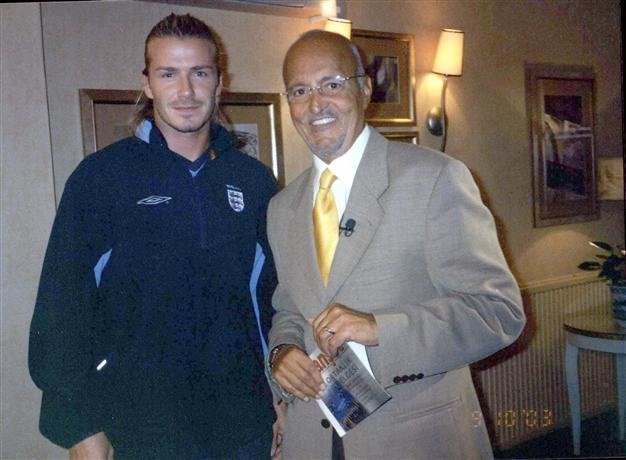Mehmet Ali Birand: The gracious face of Turkish journalism
Özgün Özçer ISTANBUL - Hürriyet Daily News

Veteran journalist Mehmet Ali Birand interviewed a number of world-renowned
names, including English football star David
Beckham. AA photo
Turkish journalism is grieving after the abrupt death of its dean and
teacher, Mehmet Ali Birand, following a cardiac arrest at the age of 71.
His inconsumable energy and eternal smile that always emitted
warmth and grace in front of the camera, combined with his work ethic
and rigor, made Birand one of the most beloved and respected
journalistic figures among the public. Birand was also a familiar voice
for
Hürriyet Daily News readers, with his spirited columns in which he felt the pulse of Turkish politics as few commentators could do.
Fellow
news anchors scarcely hid their disbelief in announcing the news of a
man who worked without interruption until he passed away. Birand had, as
usual, presented the main Kanal D news on Jan. 15, passing along his
trademark farewell at the end of the broadcast, “Tomorrow, don’t make an
appointment with anyone else.”
On Jan. 16, he underwent gallbladder surgery (laparoscopic cholecystectomy) at the
American
Hospital in Istanbul in order to replace a stent, while preparing to
broadcast the next day’s edition of “32. gün” (32nd Day), a long-running
news affairs show that had been on the air continuously since 1985.
In
his last column that he wrote from hospital, he expressed his optimism
for the ongoing peace process in Turkey, without neglecting to urge the
government to reopen a
Greek
seminary on Heybeli island that has been shuttered since 1971. However,
the journalist’s heart was unable to cope with what appeared to be a
simple operation, passing away late in the evening of Jan. 17. Birand
had been receiving cancer treatment in 2011 but had refused to slow down
his working pace.
A standard bearer In one
interview, Birand confessed that his biggest fear in life was “being
ordinary.” He need never have worried, as he was a standard bearer for a
profession whose members are still struggling to emancipate themselves.
His greatest trait was doubtlessly his ability to push the limits of
fair reporting in a context of endless political pressure, interrupted
by countless coups and crises. The many programs on which Birand worked
also functioned as an exceptional school, allowing important journalists
such as Can Dündar, Mithat Bereket, Ali Kırca and Çiğdem Anat to get
their feet wet in the journalism profession.
In addition to being
a pioneer of television news broadcasting, he was the first to
interview Abdullah Öcalan, the leader of the outlawed
Kurdistan Workers’ Party
(PKK), in 1988 and also the first to investigate the most significant
political events in Turkey with a series of documentaries: “Demirkırat”
(covering the 1960 military coup), “12 September” (focusing on the 1980
military coup) and “28 February, the last coup” (relating the events
that led to the fall of the Muslim-rooted Welfare Party government in
1997). Birand was reportedly preparing a new documentary for the first
time in years, this once about Prime Minister Recep Tayyip Erdoğan.
Abdi İpekçi was his masterBorn
on Dec. 9 1941, in Istanbul, Birand lost his father at the age of 2. He
would say of his mother, Mürvet, “She was my father and my sister, she
was everything to me.” During his childhood, he had to overcome a number
of health issues. Despite his family’s economic difficulties, he was
able to enroll in the renowned
Galatasaray
High School but couldn’t finish his studies at Istanbul University.
This event would be a defining moment of his life because, in 1964, he
started to work at daily Milliyet thanks to the offices of
journalist
Abdi İpekçi, whom he would call his “master,” along with Sami Kohen.
İpekçi, meanwhile, was assassinated by ultranationalist Mehmet Ali Ağca
in 1979.
“Until going to Galatasaray, I had no idea what I wanted
to become. During high school, I started to consider journalism. I used
to see journalism as a sheep raising its head in the herd – a sheep
which raises its head and says something among the millions of them,”
Birand would say about this period of his life. Milliyet was also the
place where he met his life partner, Cemre. The couple married in 1971
and had one son, Umur.
In 1972, he moved to Brussels to become his newspaper’s
Europe
correspondent but would become the editor-in-chief of Milliyet for a
short period after İpekçi’s murder. Birand, however, would achieve true
recognition with “32nd Day” in 1985. He used to travel from Brussels to
Ankara
for his monthly show on the public broadcaster TRT. He interviewed a
number of Turkish and foreign personalities, such as former USSR leader
Mikhail Gorbachev, former
French President François Mitterrand and legendary British Prime Minister Margaret Thatcher, the “iron lady.”
He took a big risk by interviewing Öcalan in 1988, during a time when the largely unknown
PKK
leader had yet to become a figure of such public revulsion in parts of
Turkey. The interview cost him the establishment’s support, and he had
to face many trials over the years. Despite the pressure, he returned to
Turkey permanently in 1991; the following year, he moved his program to
the private broadcaster Show TV. But he faced pressure again after the
political events of Feb. 28, 1997, for his dissident stance and was
consequently forced to leave. In 1997, he started to work at the newly
founded broadcaster CNN Turk. He had also been presenting the evening
news program at Kanal D since 2005.
Birand never denied his love
for the small screen. He would say of his outstanding communication
with the audience, “I have the ability to simplify things that look
complicated. I have always put myself in the shoes of those who are
watching me. I reacted like them. And people liked it.”
“The camera
always reveals what’s artificial,” he said on another occasion. Turkish
society will greatly miss his authenticity.
